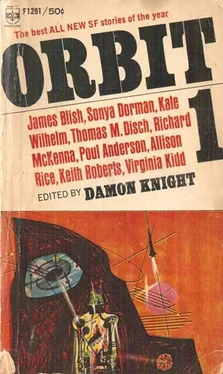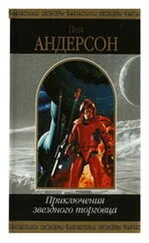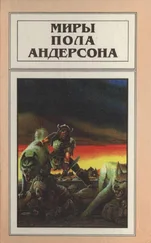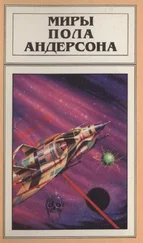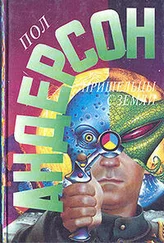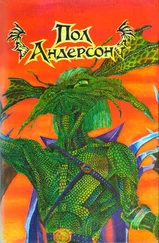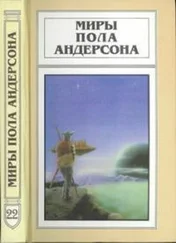Пол Андерсон - Orbit 1
Здесь есть возможность читать онлайн «Пол Андерсон - Orbit 1» весь текст электронной книги совершенно бесплатно (целиком полную версию без сокращений). В некоторых случаях можно слушать аудио, скачать через торрент в формате fb2 и присутствует краткое содержание. Год выпуска: 1966, Жанр: Фантастика и фэнтези, на английском языке. Описание произведения, (предисловие) а так же отзывы посетителей доступны на портале библиотеки ЛибКат.
- Название:Orbit 1
- Автор:
- Жанр:
- Год:1966
- ISBN:нет данных
- Рейтинг книги:4 / 5. Голосов: 1
-
Избранное:Добавить в избранное
- Отзывы:
-
Ваша оценка:
- 80
- 1
- 2
- 3
- 4
- 5
Orbit 1: краткое содержание, описание и аннотация
Предлагаем к чтению аннотацию, описание, краткое содержание или предисловие (зависит от того, что написал сам автор книги «Orbit 1»). Если вы не нашли необходимую информацию о книге — напишите в комментариях, мы постараемся отыскать её.
Orbit 1 — читать онлайн бесплатно полную книгу (весь текст) целиком
Ниже представлен текст книги, разбитый по страницам. Система сохранения места последней прочитанной страницы, позволяет с удобством читать онлайн бесплатно книгу «Orbit 1», без необходимости каждый раз заново искать на чём Вы остановились. Поставьте закладку, и сможете в любой момент перейти на страницу, на которой закончили чтение.
Интервал:
Закладка:
Godwin smiled an annoyed acknowledgment of the advice, and turned to his other side, where he had caught a flash of Liaison blue. As the Agent approached in dreamlike slow motion, yet another alien came forward. Godwin fought down the impulse to run and whispered stiffly, “On the contrary, protocol absolutely requires that we sit as they sit — Agnes!”
She had him firmly by one sleeve; a desire to squirm out of her grasp had to be mastered. He stood stock still and said through clenched teeth, “You always were too impatient with ritual. Why hurt their feelings?”
“Why soak yours?” That coolly unconcerned voice was as irritating as ever, but she was considerably prettier than she had been so many years ago, in Liaison training. “Those blocks are hollow and full of some kind of liquid that bathes them while they sit in it.” She grinned. “In their living quarters they have very different chairs — with tail supports, for one thing. Besides — don’t be so upset, Wys— they issued us the chairs we’re using; we didn’t bring them ourselves.”
One of her aides leaned over to whisper loudly, “We think they use these blocks only for formal gatherings — diplomatic parleys. Perhaps they depend strongly on odor as testimony of fear or dishonesty, and use this means to negate their own odors?”
“Exactly,” said Agnes. “Every stool a bidet.”
Godwin felt absurdly flustered as his first decision revealed itself unworkable. He had expected his ignorance to play him false, but not right off the bat, and not in a matter for which his training had prepared him.
He saw the immense tail projecting up behind the alien’s head begin to waver. “And what does that mean?” he asked Agnes, indicating “his” alien with the slightest forward motion of his head. “Why is he trembling? Is he angry at being kept waiting like this?”
He was beginning to feel angry himself — or at least trapped in this tableau with four human beings faced by four aliens, and no progress being made.
“Oh, the poor thing!” she said, her voice contrite and sweet. She laid her wrists briefly on both of theirs, Godwin’s and the monster’s, and smiled. “Now that you’ve finally arrived, he’s willing to deal with me again.”
The alien’s tail dropped immediately to the more normal position, straight out behind him. He paced with Agnes back to his sitz-bath and sat down on it. She held up three fingers to him and then drew the flat of her hand through the air as if she were cancelling a message written there.
She moved slowly through the enormous room, waking the two sleepers and tapping on the shoulder a third who looked to be in pretty bad shape. These three gathered up their trays and cups and papers, made a kind of obeisance — as if they would have crossed their own wrists but for all the junk they were carrying — and left the room.
Abruptly, everyone was seated again. One of the empty chairs had been passed awkwardly forward until it was directly opposite the largest alien, and Agnes, from her circle of aides, waved Godwin into it. “Take over, boss man,” she said.
“Oh, no, you don’t,” said Godwin. He jumped up and started to move his chair to her side. “Everybody in this room knows more about what’s going on here than I do. Let’s keep you front and center, too!”
“Don’t move so suddenly, you moron!” she shouted at him. “Put it back — where it was! I’ll come!”
He saw that every alien in the room was also on his feet, and there was abruptly a new scent making the air heavy, dizzying. Overripe melon, perhaps, or the sickly sweet smell of certain things newly dead. Godwin stood all the way up — slowly — and placed one wrist over the other. He bowed from the waist toward the largest alien. He had not seen anybody bow yet at this tea party, but it seemed like a peculiarly propitiatory gesture, recognizable in any culture.
The creature made a sound rather as if he had cleared his throat and sat slowly down again. All his fellows did likewise, while, without anyone but Agnes actually standing all the way up, half a dozen of the human delegation slid onto the vacated chair’s nearest them, playing a kind of musical chairs to leave the seat nearest Godwin’s empty. Agnes joined him, still pale with alarm.
“Didn’t you read what it says about moving slowly?” she demanded.
“The papers were kept from me,” he said, “deliberately. So happens, I just got back from six months’ off-time in Tibet, and I don’t even know what’s been on PIX or FAX, if anything.”
“You don’t?” said Agnes, with such honest disbelief that he felt greatly impelled to explain to her what frustrations had dogged him from the moment of his arrival at Communications Complex. Somehow he knew that she would not sympathize. She would have gotten hold of the transcripts the same day she arrived. He swallowed a mouthful of excuses, as she added, “Well, you’ve got the work papers now. There’s a viewer. Catch up.”
As he bored his way into the Liaison packet, the despairing sense grew that he could not master such disparate and difficult material in anything under the length of time that Harms had stolen from him by diverting the daily flow of reports. He was not trained in any science, after all — liaison comprised the arts of protocol and parataxis carried to their logical extremes, and had nothing to do with the laboratory. Yet, if Agnes had found it necessary to attach so many specialists to her group, the information they supplied must be essential. Painfully, he sorted through the worksheets for headings that looked promising, and started again.
LIAISON
Leloc — XII—35:006: Physiology
We have been unable to test, examine or dissect these animals and hence have nothing to report.
From a distance they appear to be intelligent (?) kangaroos. We presume that they share some of the characteristics of these marsupials; and we suggest that the marsupial pattern of child-bearing — that is, adults protecting their young by various means outside their bodies — is not unlikely for an extraterrestrial being. Some Earthly fish raise their offspring in such pouches, and so does the Surinam toad. The method having been independently arrived at by differing species on Earth, it is conceivable that a marsupial form may have become the dominant life form on some other planet.
It is, however, worth noting that the Earthly animal which these aliens most closely resemble — that is, the kangaroo — does not always protect its young with the fanatical concern exhibited by a human mother for her offspring. Kangaroos have been observed, when pursued, to lift their unwieldy young out of their pouches and cast them aside. In the example given earlier (35:002:) (“in the evolutionary sequence concluding with man, offspring are progressively more helpless. . smaller. . immature, etc., with the natural increase of dependency, length of suckling period, greater delay in learning to move about independently, and postponing of social and sexual maturation”) insufficient emphasis, perhaps, was placed on the emotional investment of the mother in the infant’s well-being. In the case of the Earthly kangaroo, the young are dropped from the womb as such undeveloped foetuses that they can properly be called larvae. There is disagreement as to whether they are taken by the lips of the mother and placed within the ventral pouch or whether they crawl blindly and unassisted through the belly hair to the safety of the pouch. Each larva clings by means of a temporary sucking mouth to a teat from which milk oozes or is pressed down its throat. After some four months they have grown sufficiently to emerge, but may still return to the pouch for food, rest or protection.
Читать дальшеИнтервал:
Закладка:
Похожие книги на «Orbit 1»
Представляем Вашему вниманию похожие книги на «Orbit 1» списком для выбора. Мы отобрали схожую по названию и смыслу литературу в надежде предоставить читателям больше вариантов отыскать новые, интересные, ещё непрочитанные произведения.
Обсуждение, отзывы о книге «Orbit 1» и просто собственные мнения читателей. Оставьте ваши комментарии, напишите, что Вы думаете о произведении, его смысле или главных героях. Укажите что конкретно понравилось, а что нет, и почему Вы так считаете.
